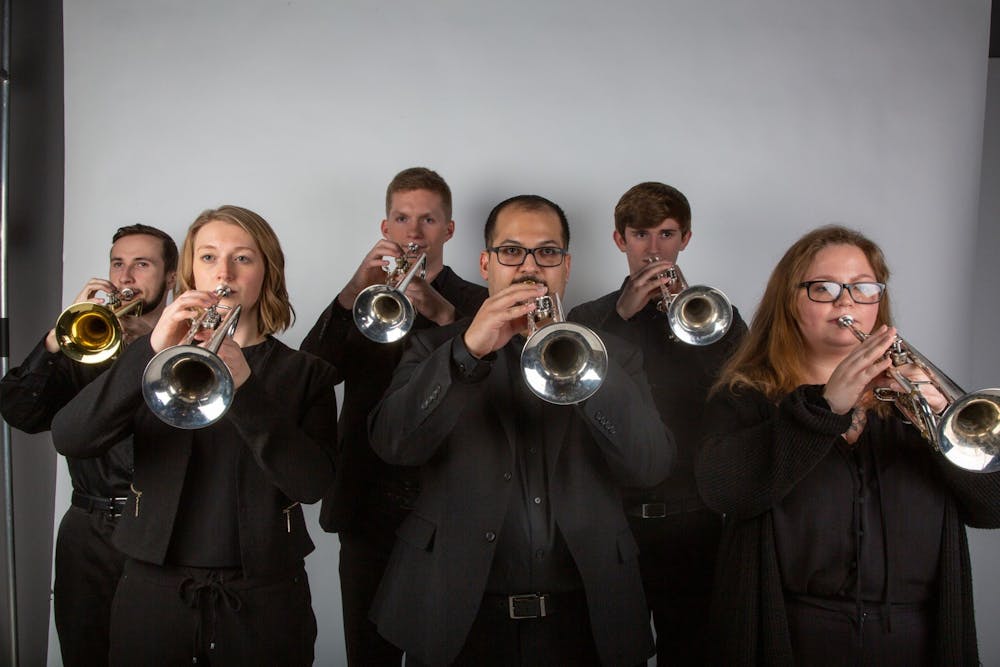Growing up, Hannah Weibert, a first-year trumpet performance graduate student, said her father constantly told her stories about his experience as a trumpet player.
“He was a real hot shot trumpet player in the ’70s in his college band,” Weibert said. “He would always play me old recordings — he’s got them on vinyl — and he would tell me things like, ‘This is my big solo — here it is!’ He told me all these stories that I loved.”
Now, Weibert plays her dad’s trumpet as a member of a trumpet ensemble in Ball State’s School of Music. She and five other Ball State music students — Grant Mason, Kieran McNamara, Eric Rodriguez, Alex Shilling and Jenna Tribbett — will head to the National Trumpet Competition Quarter Finals in Pennsylvania in March.
Shilling, freshman music education and performance major, never thought he’d be playing the trumpet in an ensemble. In fifth grade, he wanted to play the saxophone.
“We had sort of an instrument petting zoo [at school], and I went up to the trumpet and made a sound,” Shilling said. “I remember I couldn’t really play the saxophone, so I went with the trumpet, and now, it’s ended up being everything I want to do.
“[Playing in the ensemble] is a really cool experience — I’ve never done anything like this. The six of us are all really close. We have a good time, and we get a lot done.”
The six students, who are part of the School of Music’s trumpet studio, were individually selected to be members of the ensemble due to their skill level. The ensemble has been practicing three times a week since August to prepare for the competition.
“At the very beginning [of the rehearsal process], it was a little tough for us to rehearse because we’re kind of all coming from different backgrounds,” Weibert said. “There’s another guy who’s my same age, and so we’ve got the most experience, but we don’t want to take charge and take over the whole thing, so it was tough to figure out how to work together at first.”
Mason, sophomore music media production major, said he has been a member of the selective ensemble since his freshman year.
“[Eric Rodriguez] picked us for [the ensemble],” Mason said. “I guess you could say it’s kind of the higher level players. He knows how we all play, so he just put together the ones that he wanted.”
To qualify for the competition, the ensemble had to learn a piece and submit a video for judging. Weibert said the application process was competitive.
“It is a national event,” Weibert said.“They took something like 40 ensembles out of maybe 200 [to] 250 that applied.”
Going into the competition, Shilling said, he and the ensemble members feel both excited and nervous.
“Performance anxiety is something I think almost everyone goes through,” Shilling said. “For me, I’ve always had performance anxiety as long as I can remember … As an ensemble, we’ve put ourselves in as many [performance] situations as we can to get us ready.”
The ensemble will be judged based on its accuracy and how it expresses the feeling of the piece during the performance.
“One of the big things is volume when we play, but we do move, and in chamber music without a conductor, that’s really important,” Weibert said. “It’s seeing and feeling the breath. You can take a breath and know it’s an intense thing or if it’s a softer thing. It’s a timing thing, but it’s also style.”
For the competition, the ensemble will play “Dürrenhorn Passage,” which they have made adjustments to in hopes of standing out, Weibert said.
“We changed what’s on the paper to fit what our group plays a little better and what brings out what we think the composer was going for,” Weibert said. “Little volume things, direction things — we tried to adjust it to tell more of a story. We’re hoping that comes across and sets us apart.”
Contact Izzy Burks with comments at irburks@bsu.edu.





